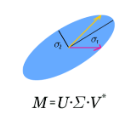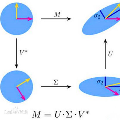The higher-order generalized singular value decomposition (HO-GSVD) is a matrix factorization technique that extends the GSVD to $N \ge 2$ data matrices, and can be used to identify shared subspaces in multiple large-scale datasets with different row dimensions. The standard HO-GSVD factors $N$ matrices $A_i\in\mathbb{R}^{m_i\times n}$ as $A_i=U_i\Sigma_iV^{\text{T}}$, but requires that each of the matrices $A_i$ has full column rank. We propose a reformulation of the HO-GSVD that extends its applicability to rank-deficient data matrices $A_i$. If the matrix of stacked $A_i$ has full rank, we show that the properties of the original HO-GSVD extend to our reformulation. The HO-GSVD captures shared right singular vectors of the matrices $A_i$, and we show that our method also identifies directions that are unique to the image of a single matrix. We also extend our results to the higher-order cosine-sine decomposition (HO-CSD), which is closely related to the HO-GSVD. Our extension of the standard HO-GSVD allows its application to datasets with $m_i < n$, such as are encountered in bioinformatics, neuroscience, control theory or classification problems.
翻译:高阶通用单值分解(HO-GSVD)是一种矩阵化因素技术,将GSVD扩大到$N\ge 2美元的数据矩阵,可用于确定多个大型数据集中具有不同行尺寸的共享子空间。标准HOS-GSVD因子因子($A_i\in\in\mathbb{R ⁇ m_i_ti times n}$$A_i=U_i\Sigma_i{Vlext{T ⁇ $),但要求每个矩阵都具有完整栏级。我们提议重订HO-GSVD,将其适用性扩大到级别不高的数据矩阵 $A_ i。如果堆叠的美元矩阵完全排名,我们显示原始的HO- GSVD的属性延伸到我们的重整。HO-GSVD的共享的正向右矢量为$A_i,我们显示我们的方法也确定了与单一矩阵的图像独特的方向,我们也将我们的标准数据序列延伸到了SOVDA。




